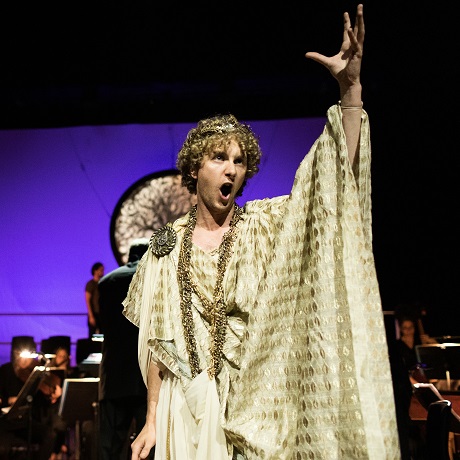
01 Jun 2019
A reverent Gluck double bill by Classical Opera
In staging this Gluck double bill for Classical Opera, at the Queen Elizabeth Hall, director John Wilkie took a reverent approach to classical allegory.
English Touring Opera are delighted to announce a season of lyric monodramas to tour nationally from October to December. The season features music for solo singer and piano by Argento, Britten, Tippett and Shostakovich with a bold and inventive approach to making opera during social distancing.
This tenth of ten Live from London concerts was in fact a recorded live performance from California. It was no less enjoyable for that, and it was also uplifting to learn that this wasn’t in fact the ‘last’ LfL event that we will be able to enjoy, courtesy of VOCES8 and their fellow vocal ensembles (more below …).
Ever since Wigmore Hall announced their superb series of autumn concerts, all streamed live and available free of charge, I’d been looking forward to this song recital by Ian Bostridge and Imogen Cooper.
The Sixteen continues its exploration of Henry Purcell’s Welcome Songs for Charles II. As with Robert King’s pioneering Purcell series begun over thirty years ago for Hyperion, Harry Christophers is recording two Welcome Songs per disc.
Although Stile Antico’s programme article for their Live from London recital introduced their selection from the many treasures of the English Renaissance in the context of the theological debates and upheavals of the Tudor and Elizabethan years, their performance was more evocative of private chamber music than of public liturgy.
In February this year, Albanian soprano Ermonela Jaho made a highly lauded debut recital at Wigmore Hall - a concert which both celebrated Opera Rara’s 50th anniversary and honoured the career of the Italian soprano Rosina Storchio (1872-1945), the star of verismo who created the title roles in Leoncavallo’s La bohème and Zazà, Mascagni’s Lodoletta and Puccini’s Madama Butterfly.
Evidently, face masks don’t stifle appreciative “Bravo!”s. And, reducing audience numbers doesn’t lower the volume of such acclamations. For, the audience at Wigmore Hall gave soprano Elizabeth Llewellyn and pianist Simon Lepper a greatly deserved warm reception and hearty response following this lunchtime recital of late-Romantic song.
Collapsology. Or, perhaps we should use the French word ‘Collapsologie’ because this is a transdisciplinary idea pretty much advocated by a series of French theorists - and apparently, mostly French theorists. It in essence focuses on the imminent collapse of modern society and all its layers - a series of escalating crises on a global scale: environmental, economic, geopolitical, governmental; the list is extensive.
For this week’s Live from London vocal recital we moved from the home of VOCES8, St Anne and St Agnes in the City of London, to Kings Place, where The Sixteen - who have been associate artists at the venue for some time - presented a programme of music and words bound together by the theme of ‘reflection’.
'Such is your divine Disposation that both you excellently understand, and royally entertaine the Exercise of Musicke.’
Amongst an avalanche of new Mahler recordings appearing at the moment (Das Lied von der Erde seems to be the most favoured, with three) this 1991 Mahler Second from the 2nd Kassel MahlerFest is one of the more interesting releases.
‘And there was war in heaven: Michael and his angels fought against the dragon; and the dragon fought and his angels, And prevailed not; neither was their place found any more in heaven … that old serpent … Satan, which deceiveth the whole world: he was cast out into the earth, and his angels were cast out with him.’
If there is one myth, it seems believed by some people today, that probably needs shattering it is that post-war recordings or performances of Wagner operas were always of exceptional quality. This 1949 Hamburg Tristan und Isolde is one of those recordings - though quite who is to blame for its many problems takes quite some unearthing.
There was never any doubt that the fifth of the twelve Met Stars Live in Concert broadcasts was going to be a palpably intense and vivid event, as well as a musically stunning and theatrically enervating experience.
‘Love’ was the theme for this Live from London performance by Apollo5. Given the complexity and diversity of that human emotion, and Apollo5’s reputation for versatility and diverse repertoire, ranging from Renaissance choral music to jazz, from contemporary classical works to popular song, it was no surprise that their programme spanned 500 years and several musical styles.
The Academy of St Martin in the Fields have titled their autumn series of eight concerts - which are taking place at 5pm and 7.30pm on two Saturdays each month at their home venue in Trafalgar Square, and being filmed for streaming the following Thursday - ‘re:connect’.
The London Symphony Orchestra opened their Autumn 2020 season with a homage to Oliver Knussen, who died at the age of 66 in July 2018. The programme traced a national musical lineage through the twentieth century, from Britten to Knussen, on to Mark-Anthony Turnage, and entwining the LSO and Rattle too.
With the Live from London digital vocal festival entering the second half of the series, the festival’s host, VOCES8, returned to their home at St Annes and St Agnes in the City of London to present a sequence of ‘Choral Dances’ - vocal music inspired by dance, embracing diverse genres from the Renaissance madrigal to swing jazz.
Just a few unison string wriggles from the opening of Mozart’s overture to Le nozze di Figaro are enough to make any opera-lover perch on the edge of their seat, in excited anticipation of the drama in music to come, so there could be no other curtain-raiser for this Gala Concert at the Royal Opera House, the latest instalment from ‘their House’ to ‘our houses’.
"Before the ending of the day, creator of all things, we pray that, with your accustomed mercy, you may watch over us."

In staging this Gluck double bill for Classical Opera, at the Queen Elizabeth Hall, director John Wilkie took a reverent approach to classical allegory.
As a long-time employee of the Hapsburg estate, Gluck was required to devise suitable entertainments for festive occasions. The celebrations for the 1769 wedding of Ferdinand, Duke of Parma (who was the grandson of Louis XV of France), and Maria Amalia, Archduchess of Austria (and sister of Marie Antoinette) were elaborate, extensive and drawn out over several months. Alongside feasts, a tournament, a Chinese fair and a display of new scientific inventions, Gluck contributed an opera-ballet titled Le feste d’Apollo comprising a prologue and three acts on Ovidian tales: Aristeo, Bauci e Filemone, and a revised and shortened version of his 1762 opera, Orfeo ed Euridice.
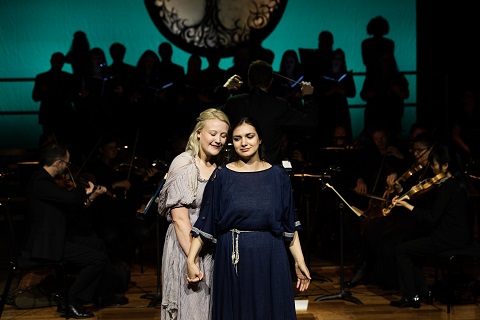 Kiandra Howarth (Euridice) and Lena Belkina (Orfeo). Photo credit: Benjamin Ealovega.
Kiandra Howarth (Euridice) and Lena Belkina (Orfeo). Photo credit: Benjamin Ealovega.
Classical Opera presented semi-stagings of the last two parts of the trio, their performance of the 1769 score of Orfeo being the UK premiere of this version. The pairing offered a good opportunity to hear the development of Gluck’s style, the ‘conventional’ seria sequence of recitative and aria in Bauci e Filemone evolving into a more dramatic interaction of words and music in Orfeo.
Bauci e Filemone tells of two young lovers, the eponymous shepherd and shepherdess, who show great respect and care for the god Jupiter when he appears before them disguised as a pilgrim. In return, the rustic couple are blessed by Jupiter with everlasting life and elevated to the status of demigods. At the same time, he curses their fellow Phrygians who had refused to help him.
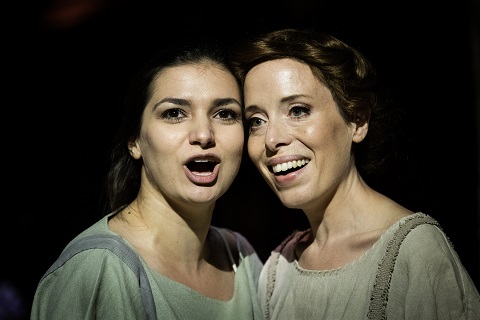 Lena Belkina (Philemon) and Rebecca Bottone (Bauci). Photo credit: Benjamin Ealovega.
Lena Belkina (Philemon) and Rebecca Bottone (Bauci). Photo credit: Benjamin Ealovega.
It’s a tender pastorale, which Wilkie and his designers, Emily Adamson and Philly Noone, sought to convey by placing a thicket of distressed silver birch trees at the side of Queen Elizabeth Hall stage and illuminating a silhouetted tree on a backdrop swathed in a sequence of strong colours - cerise, ultramarine, indigo. The action unfolded both in front of the orchestra and behind, a raised platform lifting the cast a little higher than the musicians.
The action unfolded gently, though the rather unflattering and indistinctive costumes - all beige smocks and sandals - didn’t immediately assist the ‘story-telling’, the shepherds being less than individualised. But, the music charmed, with some especially vivid and dynamic playing from The Mozartists. Lena Belkina’s Philemon and Rebecca Bottone’s Bauci formed a dulcet-toned and convincing sweet-natured duo in Gluck’s inventive duets, and Bottone confidently tackled Bauci’s stratospheric ascents in ‘Il mio pastor tu sei’, firing out heaven-bound notes that hit their target every time, the tone remaining true and full. Tenor Gwilym Bowen, looking every ounce the golden-haired god once he had cast aside his hessian rags for regal splendour, was a forthright Jupiter, relishing his ‘rage aria’, though the accompanying flickers of light didn’t quite summon a vision of celestial tumult and wrath.
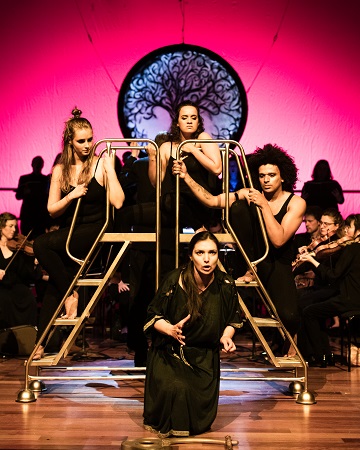 Lena Belkina (Orfeo) and Actors. Photo credit: Benjamin Ealovega.
Lena Belkina (Orfeo) and Actors. Photo credit: Benjamin Ealovega.
Kiandra Howarth sang her contribution as the Shepherdess assuredly, but had more to do as Euridice in the ensuing Orfeo. For this second part of the evening’s entertainment, Wilkie ‘enhanced’ the ragged glade by wheeling on some cheap portable ladders by which Belkina’s Orfeo, clutching a plastic lyre, would descend to Hades to rescue his beloved. Three actors, who doubled up as stage-hands, offered an array of bodily gestures which served a purpose that remained indiscernible and unfathomable to me. With the action repeated retreating to the rear, it was fortunate that the singers projected with strong characterisation and a persuasive sense of Gluckian style.
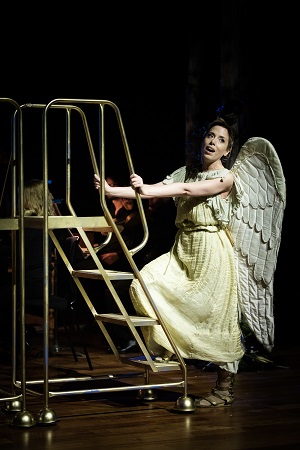 Rebecca Bottone (Amore). Photo credit: Benjamin Ealovega.
Rebecca Bottone (Amore). Photo credit: Benjamin Ealovega.
Dressed in a simple Greek tunic, Howarth expressively conveyed Euridice’s suffering. Belkina’s performance grew in intensity, impressively capturing the depth and diversity of Orfeo’s feelings. Bottone was a personable Amor, though she was encumbered with a pair of outsize wings which, along with the sliding stepladders and the flinging of gladioli about the stage, seemed out of keeping with Wilkie’s generally respectful tone. The Chorus added some of the vitality that was missing from the staging, and Ian Page, without undue fussiness, coaxed some fine playing from The Mozartists.
Last year, Classical Opera’s La finta semplice in the same hall had used costume, minimal staging and strong lighting to excellent dramatic effect. In this double bill, it was the music that took centre stage. With such fine singing and playing, perhaps it was a pity that we had not heard Aristeo too, giving us the opportunity to experience the whole of Gluck’s festale. For, Gluck himself was the star of this show.
Claire Seymour
Gluck: Bauci e Filemone and Orfeo
Lina Belkina (mezzo-soprano), Rebecca Bottone (soprano), Kiandra Howarth (soprano), Gwilym Bowen (tenor) Luke Elliott, Nadi Kemp-Sayfi & Dominyka Morkvėnaitė (actors); John Wilkie (director), Ian Page (conductor), Emily Adamson/Philly Noone (design), The Mozartists.
Queen Elizabeth Hall, London; Wednesday 29th May 2019.